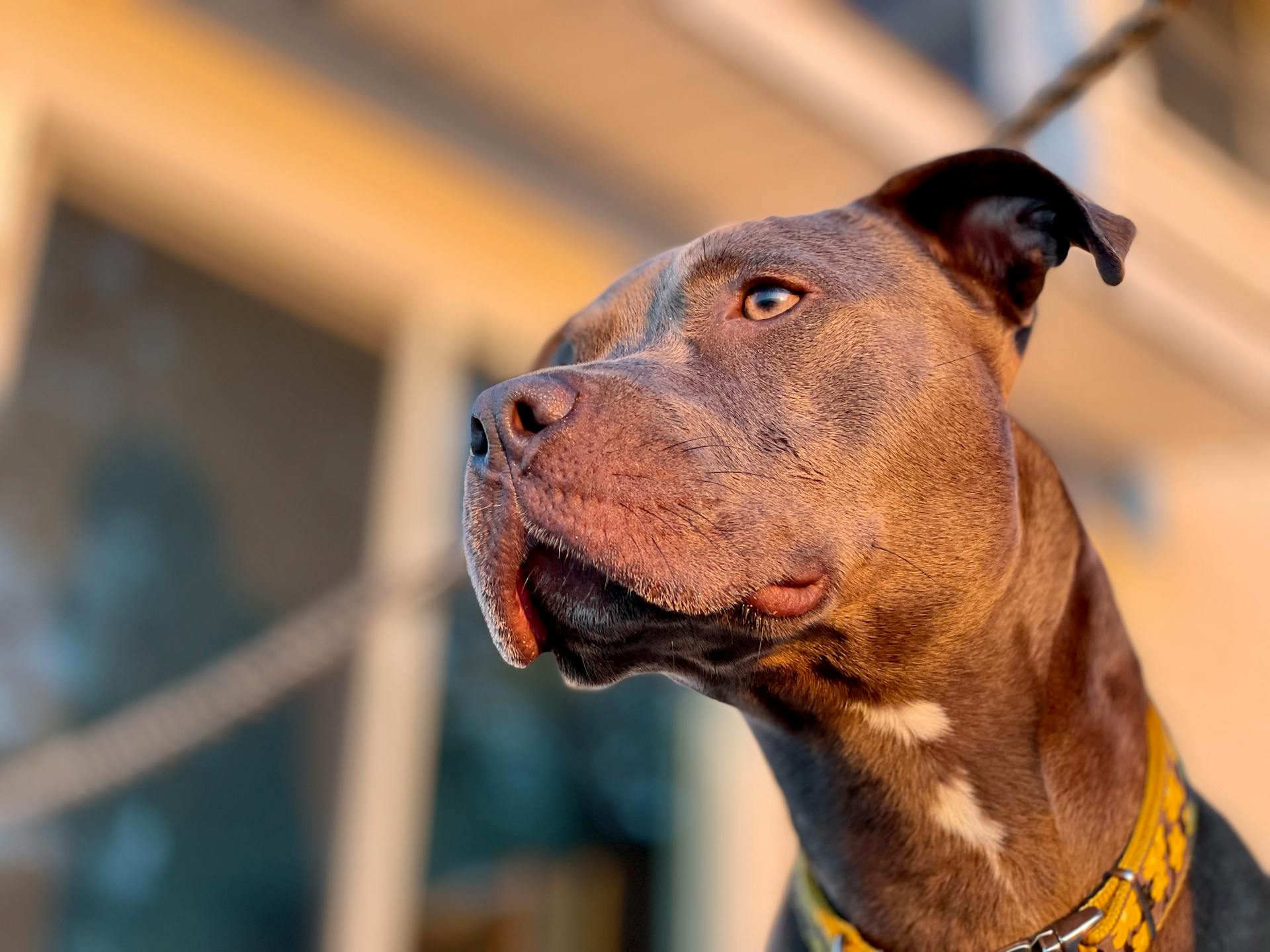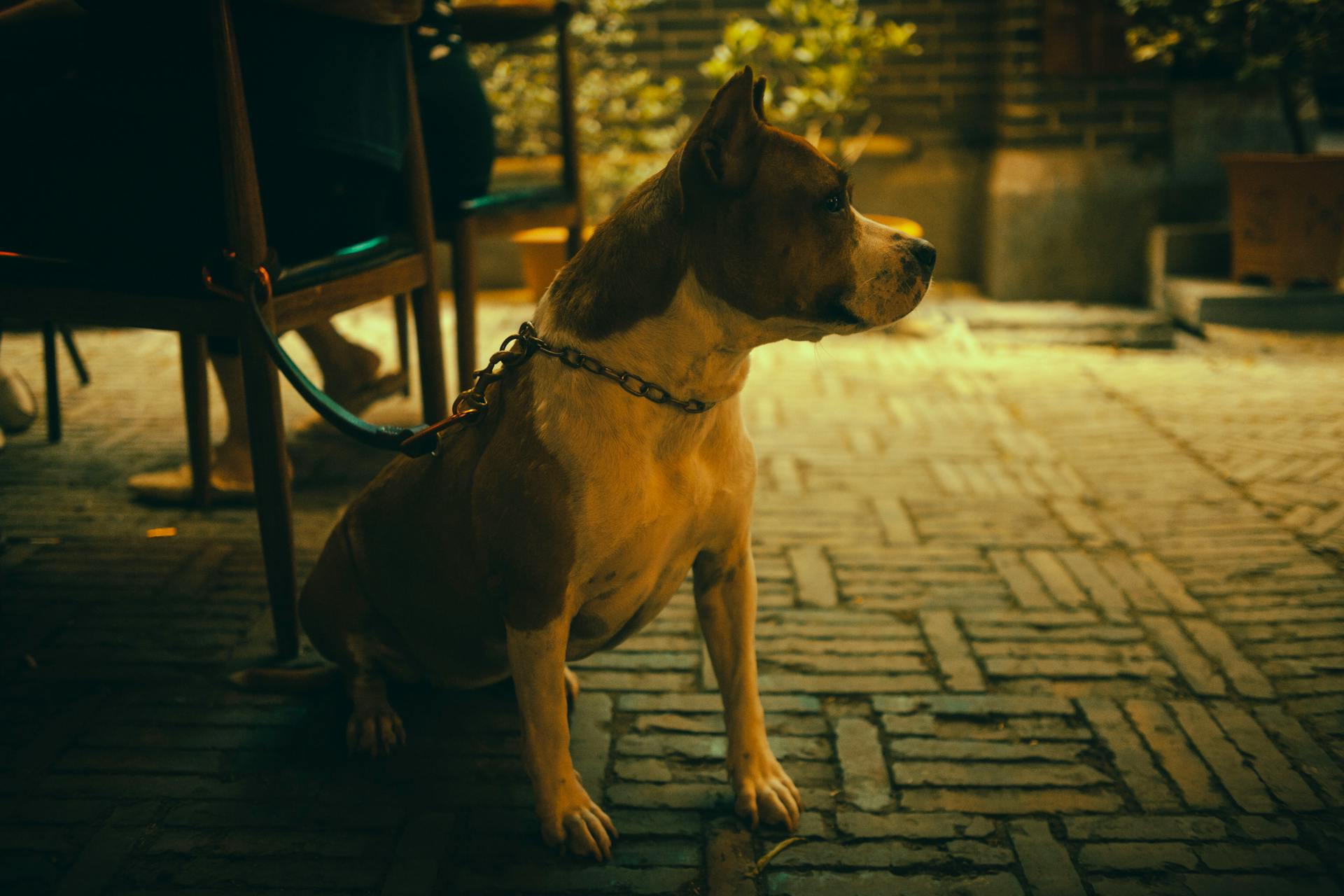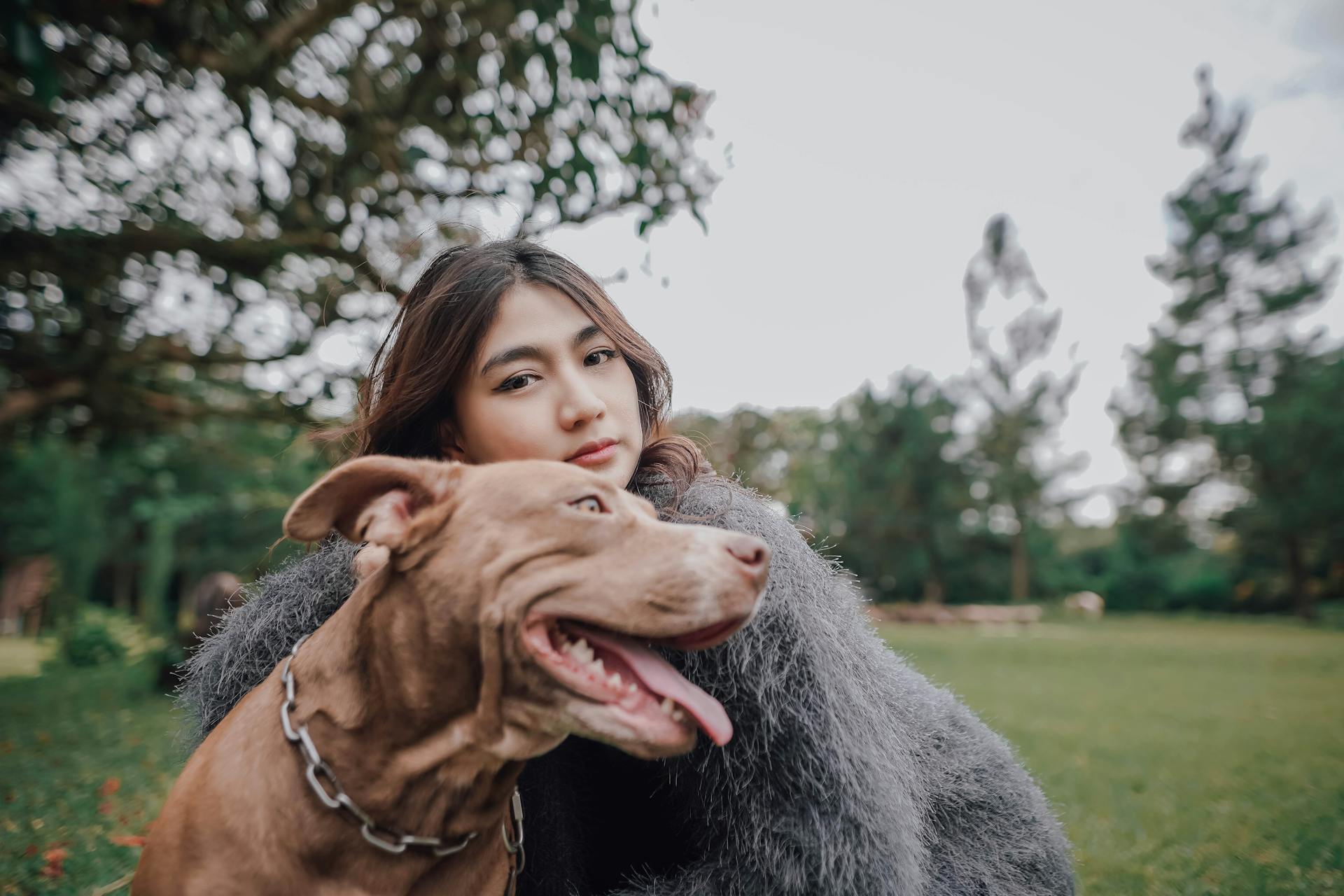
Pit Bulls are often misunderstood, but they're truly amazing dogs. They're known for their loyalty and affection towards their families.
Pit Bulls are highly intelligent dogs, ranking 32nd in Stanley Coren's book "The Intelligence of Dogs". This intelligence makes them easy to train and highly responsive to commands.
Their short coats require minimal grooming, making them a low-maintenance pet. This is great news for busy owners who want a furry friend without the extra work.
Pit Bulls are natural athletes and love to stay active, making them a great match for families who enjoy outdoor activities.
Positive Traits
Pit Bulls are incredibly resilient dogs, able to overcome physical and emotional challenges with strength and grace. This resilience often inspires their owners, as Pit Bulls maintain a positive attitude and zest for life, even in the face of adversity.
Their constant affection and playful behavior can help reduce stress, anxiety, and depression, enhancing the overall well-being of their human companions. This is especially true for people who suffer from mental health issues.
Pit Bulls are surprisingly adaptable and can thrive in various living situations, from large houses with yards to smaller, apartment-style homes, as long as they receive enough exercise and attention. They're suitable for a variety of lifestyles and environments.
Despite their muscular build and powerful appearance, Pit Bulls are incredibly gentle, especially with children. They're known to be careful and considerate around young family members, showing a tender side that belies their strength.
With a strong work ethic, Pit Bulls take on tasks with enthusiasm and diligence, whether it's a training challenge or a physical activity. This makes them versatile and useful working dogs, capable of excelling in various roles.
Highly Intelligent
Pit Bulls are very smart dogs, capable of learning commands quickly and performing a wide range of tricks and tasks. They're highly trainable due to their intelligence and eagerness to please.
Their love for learning makes them fun to train, and they enjoy the mental stimulation that comes from training sessions. This eagerness to learn can make for an engaging and rewarding training experience.
Pit Bulls are sensitive to human feelings, which makes them respond well to virtual commands. They want to please their owners, and this desire to please is a key factor in their trainability.
Physical Characteristics
Pit bulls are a sturdy breed with a muscular build, weighing between 35-60 pounds and standing between 17-20 inches tall at the shoulder.
Their short coats come in a variety of colors and patterns, including fawn, brindle, and blue.
Their broad heads, flat skulls, and distinctive underbites give them a unique and recognizable appearance.
Great for Sports
Pit Bulls are natural athletes, excelling in canine sports due to their strength and agility.
Their athletic ability also makes them great partners for activities like hiking and running. They can keep up with their owners' active lifestyle, making them a great choice for outdoor enthusiasts.
Pit Bulls often outperform many breeds in sports like weight pulling, obedience trials, and agility. This is a testament to their physical capabilities and trainability.
Their athletic build and agility allow many to climb fences with ease, making them a bit of a handful for some owners.
Dog Breed Information & Pictures
Pit Bulls are generally not excessive barkers, only raising their voice to alert their owners of something important.
They tend to have a wide range of endearing qualities and habits that make them excellent companions.
Pit Bulls have an athletic build and are very agile, which allows many to climb fences with ease.
Their athletic build is likely due to their history as wartime soldiers and mascots, including Stubby, who served in France for 18 months during WWI.
Stubby's bravery and acts of heroism earned him the rank of Sergeant, and he returned home to a hero's parade.
Pit Bulls are known for their loyalty and devotion to their owners, often being referred to as "faithful friends."
Their wrinkled forehead as puppies is a common trait that they outgrow as they age.
Here are some interesting physical characteristics of Pit Bulls:
Pit Bulls are also known for their muscular build, which is a result of their breeding history.
Their lock jaw is a myth that has been spread for years, and in reality, they have a relatively normal jaw structure.
Their bite force is actually lower than that of some other breeds, such as German Shepherds and Rottweilers.
Keen Senses
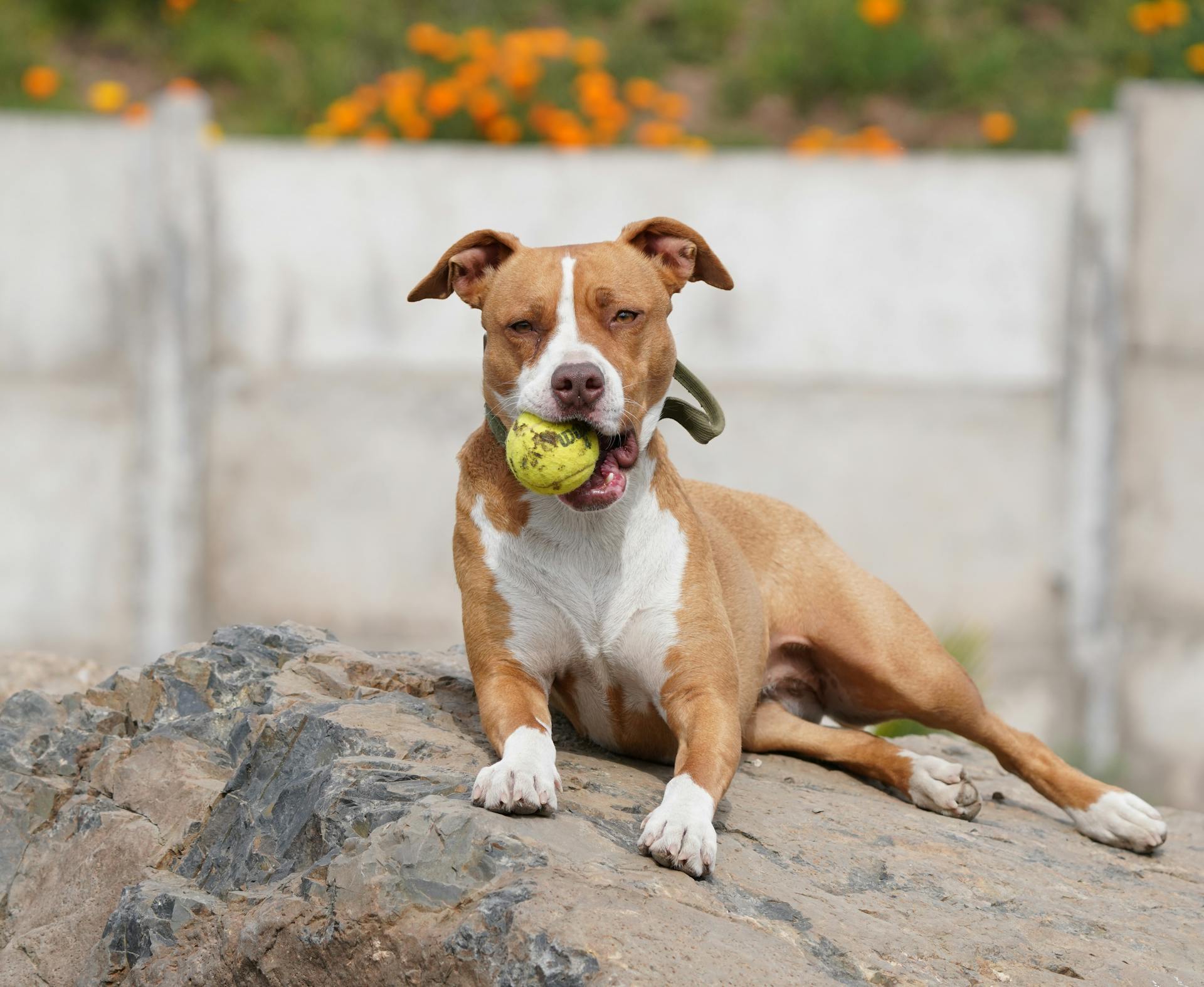
Pit Bulls have keen senses, especially their sense of hearing, which allows them to pick up on noises quickly.
Their alertness is a key contributor to their protective nature, providing an added sense of security for their families.
Pit Bulls are excellent watchdogs, alerting their owners to anything out of the ordinary.
Their keen senses make them a great asset to families who value security and a sense of safety at home.
Bull Terrier Shedding
Bull terriers do shed, but not as much as double-coated dogs.
They are single-coated dogs, which means their fur is shorter and finer compared to double-coated dogs.
Pit bulls, which are similar to bull terriers, shed all year, but especially in spring and fall.
You might enjoy: Staffies for Adoption
Social and Emotional Aspects
Pit Bulls are highly expressive, wearing their hearts on their sleeves and making it easy to understand their emotions just by looking at their faces.
Their emotional transparency helps strengthen the bond between the dog and its owner, allowing for a deeper emotional connection. This is one of the many reasons why Pit Bulls make such wonderful companions.
Pit Bulls are incredibly social with other dogs and enjoy playing and socializing with canine friends, which helps them burn off energy and stay mentally stimulated.
Proper introduction and regular socialization are key to maintaining their friendly disposition toward other pets.
Pit Bulls form deep bonds with their owners and are renowned for their loyalty, often going to great lengths to please them.
This loyalty makes them excellent companions and protective family members, always eager to show their affection and dedication.
Contrary to popular belief, Pit Bulls can be fantastic with children, being patient and gentle, making them great playmates for kids.
Their sturdy build makes them resilient enough to handle the rough play that can come with younger family members, and their loving nature drives them to be protective guardians of their little human siblings.
Pit Bulls have a profoundly positive impact on the mental health of their owners, reducing stress, anxiety, and depression, and enhancing their overall well-being.
Their constant affection, playful behavior, and emotional sensitivity make them the perfect companions for anyone looking to improve their mental health.
Discover more: Black Mouth Cur Temperament Protective
Pit Bulls are incredibly forgiving, even those that have had tough starts in life often show a remarkable ability to trust and love humans again.
This forgiving nature is testament to their resilience and capacity for unconditional love.
Pit Bulls are yearning for human connection, thriving on interaction with their families and being happiest when they can participate in family activities.
This trait makes them deeply integrated into their family units, often becoming central figures in the home.
Their adaptability and easy-going nature make Pit Bulls great companions throughout the year, whether it's a cold winter day or a summer adventure.
Their consistent companionship provides their owners with constant joy and support.
Recommended read: Are Pit Bulls a Good Family Dog
History and Facts
Pit Bulls have a rich history that's often overlooked. They've been owned by two U.S. presidents: Teddy Roosevelt and Woodrow Wilson.
These dogs have served as soldiers and mascots in wartime, including Stubby, a Pit Bull who went to war in France for 18 months during WWI and earned the rank of Sergeant.
Pit Bulls have also made their mark in popular culture, with famous Pit Bulls like Nipper, the RCA dog, and Petey, the canine companion of the Little Rascals.
Many Pit Bulls are athletic and agile, allowing them to climb fences with ease. This, combined with their strong build, makes them a force to be reckoned with.
In fact, Pit Bulls were once considered trustworthy enough with children to be called nurse maids or nanny dogs. This speaks to their gentle nature and ability to form strong bonds with their human family.
Here are some key characteristics of Pit Bulls:
- Both President Teddy Roosevelt and President Woodrow Wilson owned Pit Bull terriers.
- Pit Bulls have served as wartime soldiers and mascots, including Stubby, who went to war in France for 18 months during WWI.
- Pit Bulls have an athletic build and are very agile, which allows many to climb fences with ease.
- Pit Bulls can be musically inclined, with a Pit Bull grindcore band named Caninus featuring two Pit Bull lead singers who barked their lyrics.
Despite their many positive qualities, Pit Bulls are often misunderstood and are the most euthanized breed in the United States.
Care and Management
Pit bulls are highly energetic dogs that need regular exercise to stay happy and healthy. They require a fenced yard where they can run around and play, and their owners should take extra care to ensure the fence is secure and can't be tunneled under.
A pit bull's athletic nature means they need to be walked on a leash with a harness that limits their ability to pull the handler. This will help prevent injuries to both the dog and the owner.
Pit bulls also excel at dog sports like agility, obedience, and scent work, which can provide mental and physical stimulation.
Long Lifespan
Pit Bulls can enjoy a long lifespan, often living up to 12-14 years or more with proper care.
This means you'll have plenty of time to develop a deep and lasting bond with your pet, enjoying the loyalty and companionship that Pit Bulls bring.
Care and Upkeep
Pit bulls are not well suited for dog parks, and their behavior can change when they mature or are challenged by another dog.
They need a fenced yard to exercise, and the fence must be secure with strong and tall sides that can't be tunneled under.
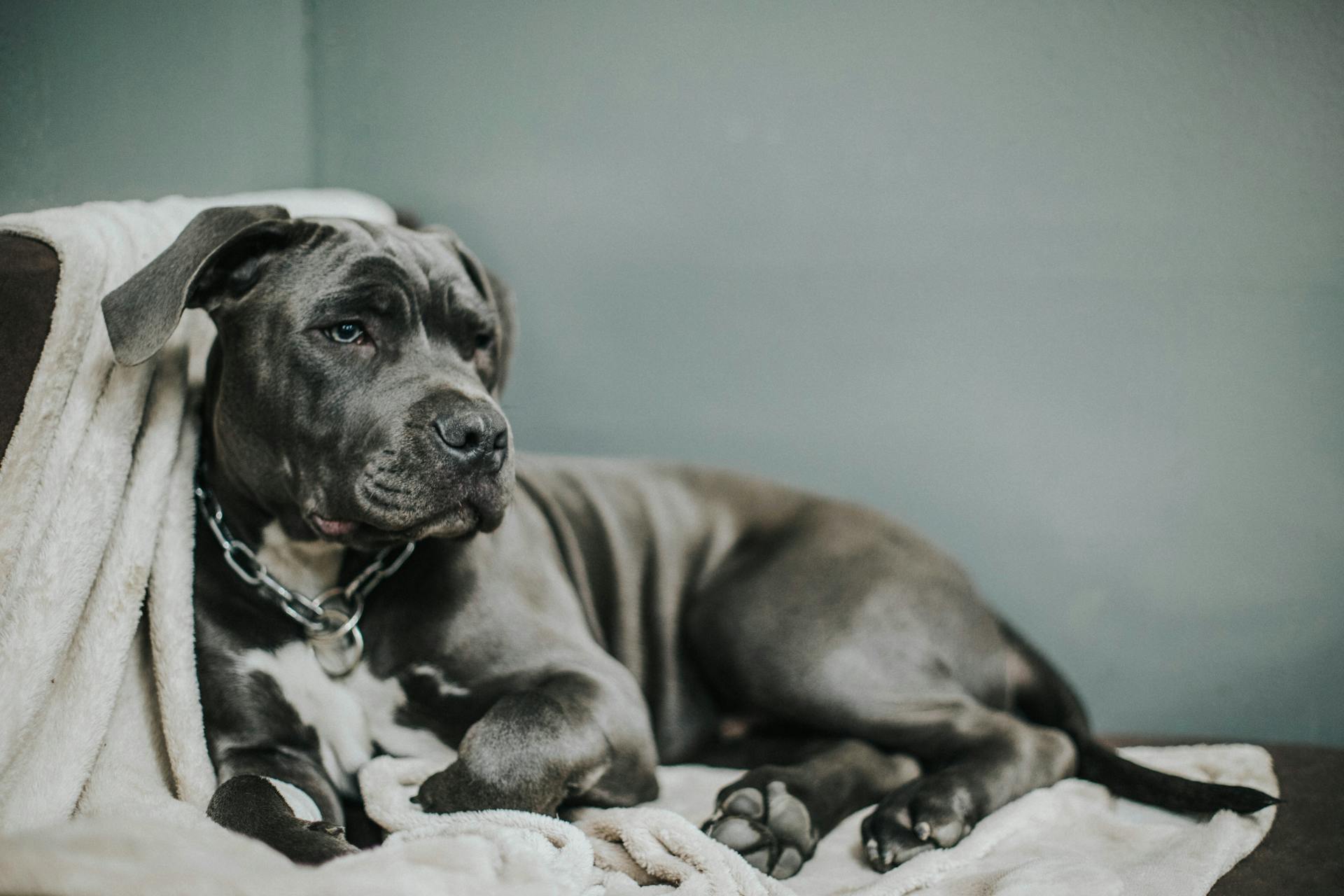
Extra care should be taken to ensure the fence is secure, as pit bulls are athletic and tenacious.
Time in the yard should be supplemented with leash walks, and a pit bull should wear a harness that limits the dog's ability to pull the handler.
The breed excels at weight pulling, and they may or may not like swimming.
Coat care is minimal, consisting of occasional bathing and weekly brushing.
Pit bulls do not like extreme cold or heat.
They are susceptible to various bone diseases, notably hip dysplasia, which can be treated with surgery and physical therapy.
Recommended read: Pit Bulls Are Not Dangerous
Featured Images: pexels.com
